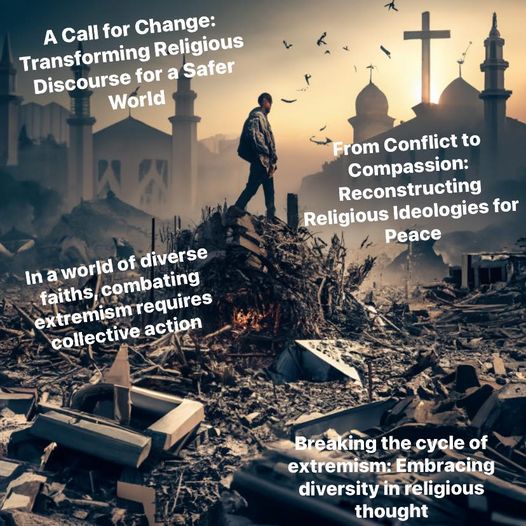
The core of any religion is rooted in widespread communication passed down through generations. In Islam, this foundation also extends to consensus-based practices, such as the emulation of Prophet Mohammad’s actions in prayer or preserving the Quran through memorization over time. Thus, there’s no inherent extremism in Islam, Judaism, Hinduism, Christianity, or other religions. However, religious interpretation, a human endeavor, has birthed various movements over the past two centuries, fostering extremism across religions.
These interpretations often harbor extremist elements. For instance, certain Muslim interpretations reject democratic principles and advocate global Muslim rule. Likewise, certain Jewish doctrines advocate for exclusive claims to Palestine’s sacred land, including the expulsion of indigenous inhabitants, while certain Hindu doctrines envision a consolidated Greater Hindu India. Even secular ideologies, such as democracy promotion by select Western nations, can inadvertently exacerbate extremism when utilized for political purposes.
While extremism isn’t typically taught in schools or religious institutions, these ideologies can shape mindsets and aspirations. Political manipulation, as seen in Pakistan in the 1970s-80s, exploited these ideologies for personal agendas. Similarly, in Israel, visions of a Greater Israel emerged, while in the USA, wars were justified under the guise of spreading democracy. In India, Hindu nationalists perceive non-Hindu religions as threats to culture and security, leading to symbolic victories like the destruction of the Babri mosque.
Counter ideologies, rather than resorting to violence and warfare, are vital in addressing extremism comprehensively and promoting worldwide harmony. These belief systems, whether rooted in religion or secularism, have been manipulated to justify acts of violence and aggression, exemplified by the emergence of groups like ISIS/ISIL after the Iraq War in 2003. Additionally, these ideologies often intersect, as witnessed in the aftermath of the conflict in Iraq, where the absence of authority gave rise to entities like ISIS/ISIL. Furthermore, these ideologies directly contradict the divine plan of creation. God’s focus is on individual selection rather than mass selection; therefore, such ideologies only lead to destruction and ultimately fail to align with divine intentions.
In 1930, the revered Muslim poet and philosopher Allama Iqbal, hailing from British India, cautioned that neglecting the reconstruction of religious ideologies could provoke conflict with significant world powers (refer to The Reconstruction of Religious Thought in Islam https://a.co/d/3Qru37R ). Similarly, there is an urgent need to tackle and reshape other religious ideologies. Therefore, fostering global peace demands the nurturing and propagation of alternative ideologies to efficiently combat both religious and secular extremism. Altering entrenched mindsets often requires education as a catalyst for change.
When any ideology, whether religious or secular, becomes entangled with politics, it tends to veer toward extremism.

